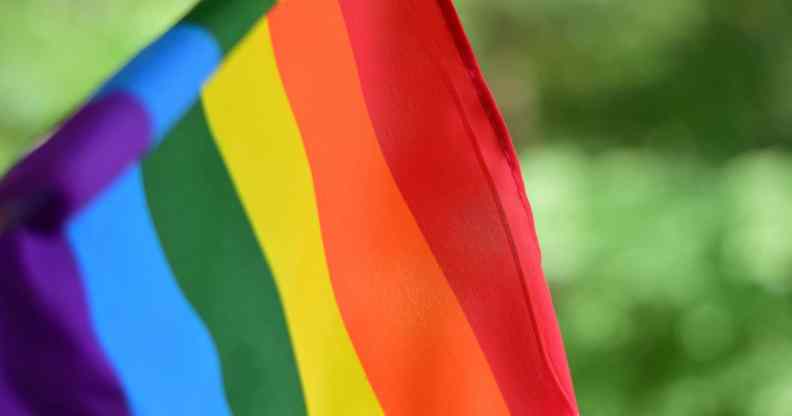Peaceful queer activist ‘dragged out and handcuffed’ for protesting police’s ‘pink-washing’ Pride flag ceremony

The Pride flag raised by police replaced the Indigenous flag at the Alice Springs police station. (Envato)
A peaceful queer activist was arrested at a police-organised Pride flag raising ceremony in Australia, in a moment of terrible irony.
The flag raising ceremony marked the official start of FABalice, the Pride festival in Alice Springs, a town in Australia’s Northern Territory.
According to Star Observer, the local LGBT+ community were uncomfortable with the Pride flag being displayed outside a police station, claiming it was a “pink-washing PR” exercise that erases past abuse by police services against Indigenous and LGBT+ folk.
The police were also removing the Indigenous flag from the police station in Alice Springs, which has a large Indigenous population, to replace it with a rainbow Pride flag.
A group of activists decided to gather outside the station during the ceremony for a “peaceful protest”, but activist Meret McDonald said police soon turned on them.
They said: “I was standing peacefully with a sign but as soon as the cameras turned to the flag raising, I was surrounded by uniformed police officers in the front and under-cover police behind me.
“I was dragged out and handcuffed. The police arrested me without any notice.”
Northern Territory police confirmed the arrest to the publication, and said in a statement: “We raised the flag as an agency which supports and encourages those who identify as LGBT+ within the community and our agency.
“There was a group of people who attended to protest the flag raising, and a 30-year-old person was arrested and later issued an infringement for disorderly behaviour.”
McDonald was released more than three hours after their arrest, given a 72-hour loitering notice and fined $472 (£263).
The activist said: “I have seen friends irrevocably traumatised by their treatment at the hands of the state here in Alice Springs – ridiculed and tortured for being queer.
“It is a disgusting act to raise our flag, a spit in the face for all of us that work hard here in Alice Springs to support each other through dedicated community-mindedness, visibility and health advocacy.”
Carmen Robinson, who previously organised a different Pride festival in Alice Springs, added: “They arrested a queer person at the rainbow flag raising ceremony… Why do the police think they are entitled to claim space as ‘allies’ and centre themselves in our queer community Pride, when they actively perpetrate violence against us?”
The ethics of bringing police into Pride celebrations has long been debated by the global LGBT+ community.
Last year, a Twitter campaign was launched that sought to ban the Metropolitan Police marching at Pride in London, stressing the institutional racism pervasive within the police – an issue that even Met chiefs have acknowledged.
But this month, Pride in London rejected calls for a ban on police, insisting that the LGBT+ community it “mixed” on the issue, and that “for now, it is better to work in an inclusive process with the [Met] to bring the wider LGBT+ communities together”.

